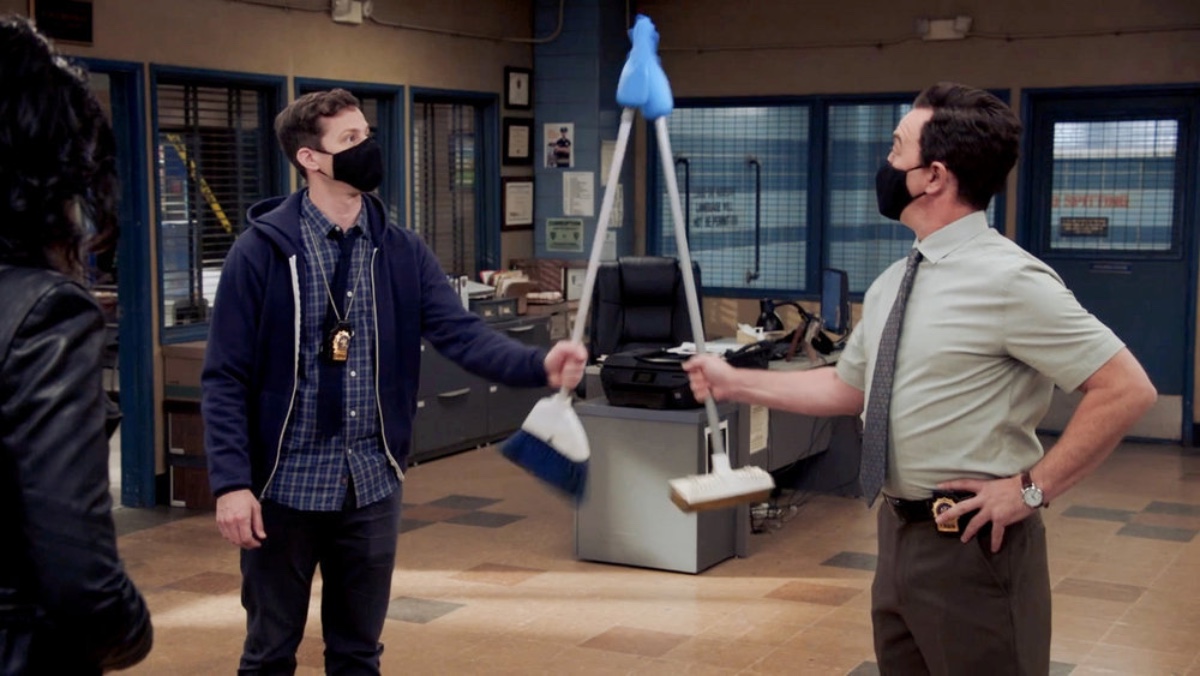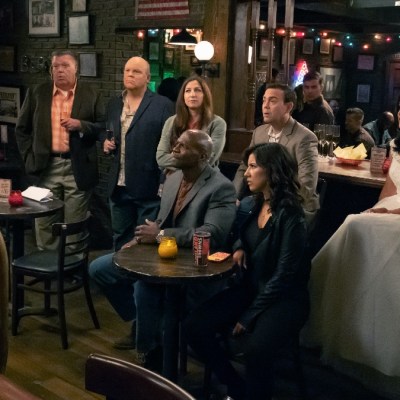This Brooklyn Nine-Nine review contains spoilers.
Brooklyn Nine-Nine Season 8 Episodes 1 and 2
It would an understatement the size of Terry’s pecs to say that the world has changed a lot since Brooklyn Nine-Nine’s last episode. Besides a historic pandemic that has changed the way we operate at work and in public, America also reckoned with egregious examples of police brutality that found many discussing police reform, systemic racism, and even abolishing policing as we know it altogether.
In the aftermath of the George Floyd protests, the cast and crew of Brooklyn Nine-Nine spoke at length about their discomfort portraying light-hearted cops on television and discussed ways in which they could meaningfully address painful, complicated issues. Creator Dan Goor threw away four scripts for the final season in order to make sure that his show was not glossing over relevant conversations around policing.
“We’ve had a lot of somber talks about it and deep conversations and we hope through this we’re going to make something that will be truly groundbreaking this year. We have an opportunity and we plan to use it in the best way possible,” Terry Crews told Access Daily. “This is an opportunity right now for us all to unite and get together and understand what this is and that we have to battle this together.”
Brooklyn Nine-Nine season 8’s first episode immediately makes it obvious that the Nine-Nine would be tackling the issues of police brutality and institutionalized racism head on. While COVID gets the first shine in the cold open, Rosa quickly makes the intention of “The Good Ones” clear by announcing her resignation from the police force. Disgusted by the actions of the police force and feeling complicit, Rosa resigns with the intention of becoming a private investigator focused on helping the victims of police brutality. Her first case finds her helping a client who was a victim at the hands of two Seven-Four officers, and since Jake knows the captain and is looking to reconnect with Rosa, he offers his services.
Read more
Working the case together ends up being trickier then Jake realizes. Not only is there an obnoxious union representative played by the great John C. McGinley, but Jake also lets his defensiveness about his decision to remain on the force impact his ability to meaningfully support Rosa and her client. Jake feels like Rosa is judging him for his choice to remain a police officer despite the injustices that are routinely occurring in the country, but it is not Rosa’s job to help him feel secure in his decisions. He’s also making the case about himself than the victim.
Brooklyn Nine-Nine has shown how deft they are with dealing with sensitive topics in the past, and once again they prove to be incredibly measured and economical with their discussion about the responsibility of the “good” police officers here. Jake and Rosa eventually overcome their differences and recover a key piece of evidence that implicates the offending officers, but are brutally shown just how purposefully difficult it is to prosecute against bad cops. Many of Jake’s “I’m one of the good ones” talking points are thrown back into his face and we’re shown just how much work still needs to be done to ensure fair repercussions against corrupt officers. It’s funny, but in a terribly bleak sort of way.
Funnier is a subplot showing Charles trying to prove his “woke-ness” to Terry. Charles is the perfect person to embody the well-meaning, but misguided “ally,” performatively showing his support of Black lives and rights while still doing some cultural appropriation and general Charles much-ness. It’s more of a lighthearted approach to what might be this season’s overarching themes.
Finally, Amy returns to the force, but finds that her relationship with Holt has suffered in her absence. Eventually we learn that Holt’s distance has little to do with Amy; he and Kevin have separated. In one of Andre Braugher’s finest moments of the series, he relays how the year has been hard to be a Black man, a police officer, and with COVID, just a human in general, and his relationship with Kevin has suffered as a product of those hardships. It’s moments like this that make Brooklyn Nine-Nine more than a silly hang-out show. “The Good Ones” is an excellent starting point for Season 8 with many new status quos to navigate.
However, second episode “The Lake House” does feel slight in comparison. The entire gang, minus a missing Hitchcock, who unfortunately has retired, accompanies Holt to his lake house, which is just a lake house in name and not near an actual lake, to help him move through his feelings about Kevin. Jake tries to help “parent trap” the pair, but his efforts go hilariously array, before eventually actually proving that there may be life in Holt and Kevin’s relationship after all. This is Brooklyn Nine-Nine by the numbers, and it loses some points for lame, outdated jokes about weed edibles and a cliché parenting story with Amy and Charles. However, this is a great recurring bit about how Terry loves hedging, but hates ledges. Overall, it’s a passable, if unspectacular installment.
Brooklyn Nine-Nine doesn’t need to be addressing social issues to be great, but it certainly helps having deeper subject matter to off-set the silliness and sitcom trappings. The final season of this beloved show is here, and I’m curious to see how deep things will get before the end. If the first episode is any indication, expect a lot of emotional moments ahead!

